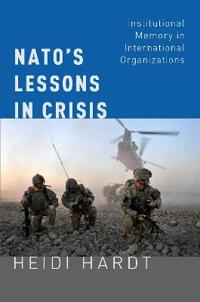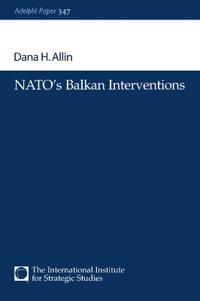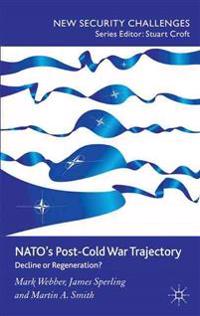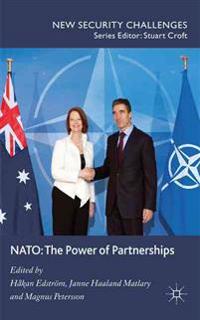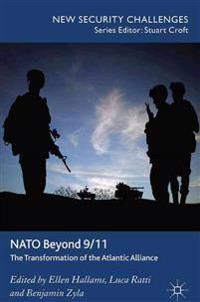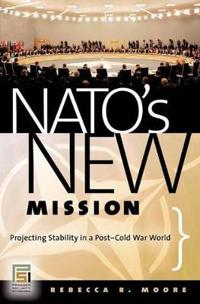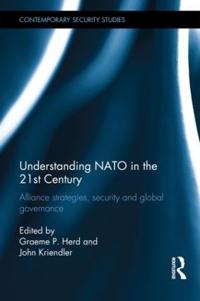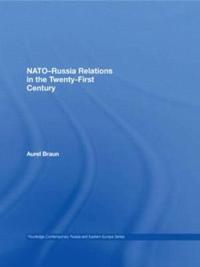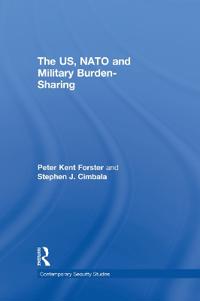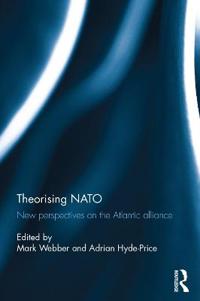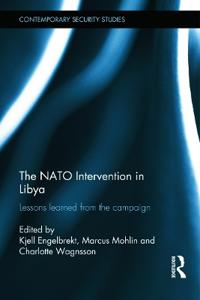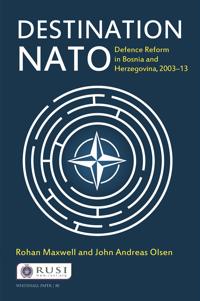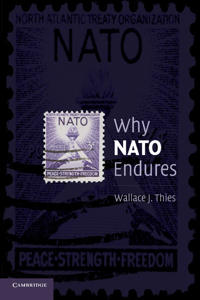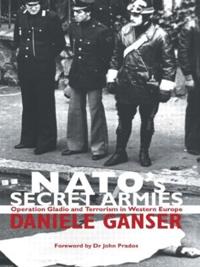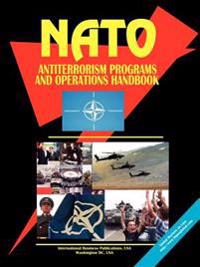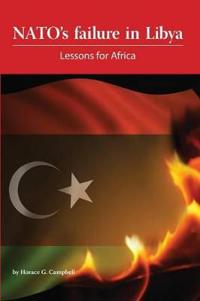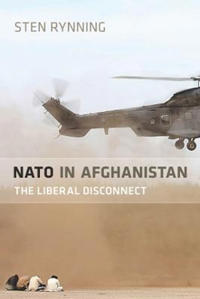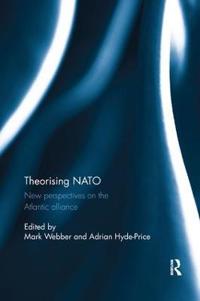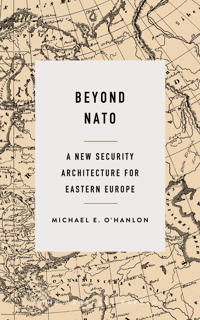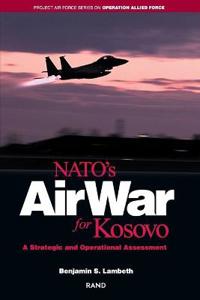The Cauldron: Nato's Campaign in Libya
ISBN: 9780190916220 - UTGIVEN: 2018-10In March 2011, NATO launched a mission hitherto entirely unthinkable: to protect civilians against Libya's ferocious regime, solely from the air. NATO had never operated in North Africa, or without troops on the ground; it also had never had to move as quickly as it did that spring. It took seven mo[...]
NATO's Balkan Interventions (Häftad)
avDana H. Allin
ISBN: 9780198516767 - UTGIVEN: 200502This book examines NATO's Balkan interventions over the entire decade starting with the break-up of Yugoslavia in 1992. Focusing on the wars in Bosnia and Kosovo, it traces the record of early transatlantic failures and later successes as once bitterly divided allies were able, finally, to unite aro[...]
NATO's Post-Cold War Trajectory (Inbunden)
avMark Webber, James Sperling, Martin A. Smith
ISBN: 9780230004528 - UTGIVEN: 201208NATO is the perennial survivor. Crises come and go, yet still it persists. Two decades since the watershed of the Cold War, this book investigates NATO's staying power. From the collapse of the Soviet Union through wars in the Balkans, and interventions in Afghanistan and Libya, the Alliance has ada[...]
NATO: The Power of Partnerships (Inbunden)
ISBN: 9780230273771 - UTGIVEN: 201104NATO has many partner countries, not only in Europe but also globally. The political and military utility of all these partnerships is clear; they 'provide' more security than they 'consume'. But the utility for NATO of partners also changes over time. This is the first book that scrutinizes NATO's [...]
NATO Beyond 9/11 (Inbunden)
avEllen (EDT) Hallams, Luca (EDT) Ratti, Benjamin (EDT) Zyla
ISBN: 9780230391215 - UTGIVEN: 2013-11This volume brings together leading scholars from both sides of the Atlantic to examine the significance of 9/11 for the transformation of the Atlantic Alliance over the last decade. Blending international relations, political science, IR theory and history, it asks whether 9/11 represents a major t[...]
NATO's New Mission (Inbunden)
avRebecca R. Moore
ISBN: 9780275992965 - UTGIVEN: 200702Reports of NATO's death have been greatly exaggerated. Characterisations of NATO as a "relic" of the past do not square with the fact that the Alliance is busier today than at any time in its history. As Europe has become more unified and more democratic, NATO has assumed new layers of significance [...]
Understanding NATO in the 21st Century (Inbunden)
ISBN: 9780415436335 - UTGIVEN: 200907Understanding NATO in the 21st Century enhances existing strategic debates and clarifies thinking as to the direction and scope of NATO's potential evolution in the 21st century. The book seeks to identify the possible contours and trade-offs embedded within a potential third "Transatlantic Bargain"[...]
NATO Russia Relations in the Twenty First Century (Häftad)
avAurel Braun
ISBN: 9780415546379 - UTGIVEN: 2009-05Since the end of the Cold War NATO has redefined its raison d'etre, extending its membership, broadening its political goals and widening its zone of operation. It has also sought to enhance its co-operation with Russia, for example through the NATO-Russia Council, though moves here have coincided [...]
Nato's Security Discourse After The Cold War (Inbunden)
avAndreas Behnke
ISBN: 9780415584531 - UTGIVEN: 2012-07-13Offers an investigation into the discursive processes through which the North Atlantic Treaty Organisation (NATO) reproduced a geopolitical order after the end of the Cold War and the demise of its constitutive enemy, the Soviet Union.[...]
The US, NATO and Military Burden-sharing (Pocket)
avStephen J. Cimbala, Peter Forster, Stephen J. Cimbala
ISBN: 9780415653077 - UTGIVEN: 2015-05This study establishes that the political, economic and military-technological changes that transform the international system also alter the way in which a state views its and others' responsibilities and burdens for responding to international crises. It assesses the distribution of the costs of r[...]
Theorising NATO
ISBN: 9780415688994 - UTGIVEN: 2015-12Scholarship on NATO is often preoccupied with key episodes in the development of the organisation and so, for the most part, has remained inattentive to theory. This book addresses that gap in the literature. It provides a comprehensive analysis of NATO through a range of theoretical perspectives th[...]
The NATO Intervention in Libya (Inbunden)
ISBN: 9780415705493 - UTGIVEN: 2013-10This book explores 'lessons learned' from the military intervention in Libya by examining key aspects of the 2011 NATO campaign. NATO's intervention in Libya had unique features, rendering it unlikely to serve as a model for action in other situations. There was an explicit UN Security Council manda[...]
Destination NATO
ISBN: 9780415718400 - UTGIVEN: 2014-03Defence reform has been a major component of Bosnia's stabilisation and nation-building. Though true for many cases of post-conflict transition, it is especially so for Bosnia, which arguably has the most complex state structure in Europe. Ten years on from the start of Bosnia's defence-reform proce[...]
NATO and Collective Defence in the 21st Century
ISBN: 9780415786294 - UTGIVEN: 2017-03This book presents a cutting-edge assessment of NATO's collective defence strategies in the immediate aftermath of the July 2016 NATO Warsaw Summit. Collective defence and deterrence came back on the agenda at the 2014 Wales Summit following the Russian annexation of Crimea, and was in many respects[...]
Why NATO Endures (Häftad)
avWallace J. Thies
ISBN: 9780521749794 - UTGIVEN: 200906Why NATO Endures examines military alliances and their role in international relations, developing two themes. The first is that the Atlantic Alliance, also known as NATO, has become something very different from virtually all pre-1939 alliances and many contemporary alliances. The members of early [...]
NATO in Afghanistan (Inbunden)
ISBN: 9780691159386 - UTGIVEN: 2014-01Modern warfare is almost always multilateral to one degree or another, requiring countries to cooperate as allies or coalition partners. Yet as the war in Afghanistan has made abundantly clear, multilateral cooperation is neither straightforward nor guaranteed. Countries differ significantly in what[...]
NATO's Secret Armies (Häftad)
avDaniele Ganser
ISBN: 9780714685007 - UTGIVEN: 200412This fascinating new study shows how the CIA and the British secret service, in collaboration with the military alliance NATO and European military secret services, set up a network of clandestine anti-communist armies in Western Europe after World War II. These secret soldiers were trained on remot[...]
NATO Antiterrorism Programs and Operations Handbook (Häftad)
ISBN: 9780739733639 - UTGIVEN: 2005-05NATO Antiterrorism Programs and Operations: Strategic information and contacts
Theorising nato - new perspectives on the atlantic alliance
ISBN: 9780815371090 - UTGIVEN: 2017-12Scholarship on NATO is often preoccupied with key episodes in the development of the organisation and so, for the most part, has remained inattentive to theory. This book addresses that gap in the literature. It provides a comprehensive analysis of NATO through a range of theoretical perspectives th[...]
Beyond NATO (häftad)
ISBN: 9780815732570 - UTGIVEN: 2017-07In this new Brookings Marshall Paper, Michael O'Hanlon argues that now is the time for Western nations to negotiate a new security architecture for neutral countries in eastern Europe to stabilize the region and reduce the risks of war with Russia. He believes NATO expansion has gone far enough. [...]
Nato's Air War for Kosovo
ISBN: 9780833030504 - UTGIVEN: 2001-09This book offers a thorough appraisal of Operation Allied Force from a military, political, and strategic perspective, calling attention to those issues that are likely to have the greatest bearing on future military policymaking.[...]

